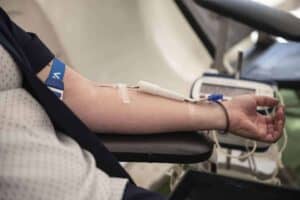In SA, at least 71% of the population relies on the public health system and only 27% can afford private care, while about 14 in every 10 000 people are diagnosed with leukaemia every year.

Despite developments in cancer prevention, diagnosis and treatment, half of the country’s population does not get the full range of essential health services.
Low awareness means as many as 60% are not aware of the different types of cancers and only a few South Africans are willing to volunteer as donors to help in stem cell cancer treatments.
According to experts, besides the public healthcare system being a major challenge, the lack of knowledge, education and awareness about the disease hinders any action against it and the possibility preventing millions of deaths each year.
World Cancer Day
Today is World Cancer Day to raise awareness, improve education and urge action towards a world where millions of preventable cancer deaths are averted and where cancer treatment and care is equitable for all.
Professor Shingai Mutambirwa, head of department of urology at Sefako Makgatho Health Sciences University, and Nick Levesley, founder of the Hollard Daredevil Run, reiterated the importance of raising awareness and improving education.
ALSO READ: Cancer: About one million children lose a mother every year
“Men whose prostate cancer is detected earlier have a 95% chance of being cured,” Mutambirwa said.
Prostate Cancer Foundation of South Africa chief executive Andrew Oberholzer said black African men are at a much higher risk of getting prostate cancer than any other race group.
“The Prostate Cancer Foundation is grateful to be part of the Hollard Daredevil Run, which uses an element of fun to shed light on what is often a scary subject for men,” he said.
“The event challenges men to step out of their comfort zone by wearing a Speedo, but it also brings them face to face with the reality that testicular and prostate cancer could affect anyone of them.”
This video is no longer available.
According to international nonprofit DKMS Africa, in SA at least 71% of the population relies on the public health system and only 27% can afford private care, while about 14 in every 10 000 people are diagnosed with leukaemia every year.
“In children, this increases to 271 and is the most commonly diagnosed cancer amongst South African kids,” the organisation said.
“There is a lack of awareness about blood diseases and misconceptions about the donor registration process.
“In South Africa, specifically, there are cultural barriers to becoming a stem cell donor that need to be addressed.”
South African Bone Marrow Registry
A digital survey by the South African Bone Marrow Registry showed “while the vast majority consider bone marrow stem cell donation as vitally important to saving lives, 45% still mistakenly believe bone marrow stem cell donation involves a painful, surgical procedure where bone marrow is taken from one’s bones or spine”.
The survey further noted that although 92% of the respondents knew what bone marrow stem cells were used for, at least 22% confused it with a blood transfusion, while seven percent referred to it as solid organ transplantation.
This video is no longer available.
“Forty-five percent still think bone marrow stem cell donation involves a painful, surgical procedure where bone marrow is taken from one’s bones or spine,” the report noted.
“The majority (55%) of these respondents are black [and] fall into a low-income status, with only a matric certification.
“Thirty-six percent are unaware that patients are most likely to find a 10/10 bone marrow stem cell donor match within their own ethnic population group.
“Fifty-one percent of these respondents are black, 28% white, 15% coloured and six percent Indian, and are classified as low-income earners with only matric.”
ALSO READ: New study reveals main causes of cancer worldwide
The study also revealed there was a lack of awareness of “what the peripheral blood stem cell donation process entails”.
“Only 11% correctly described it as a procedure whereby blood is taken from a donor’s arm, which is then put through a device that separates the stem cells from the blood,” the study said.
“Almost half of respondents are unaware of how difficult it is to find a bone marrow stem cell match, while a further 36% are ignorant of the role ethnicity plays in finding a suitable match.”






